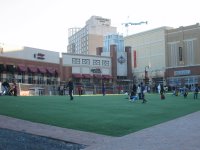can an observer be a participant?
have i seen too much?
does it count if it doesn't touch?
if the view is all i can ascertain
pure understanding is out of range
if i make that call
why can't i make that change?
i'm an ex-spectator
can't you see?
i'm an ex-spectator
never let my never let my vision
get in the way of me
—Fugazi, "Ex-spectator"
 I took these pix while cruising around the DC Metro area on my fixie. The scenes they convey share a common theme—that of simulation—and the fact that I came upon them all within a two week period seemed a bit uncanny, to the point of prompting this post.
I took these pix while cruising around the DC Metro area on my fixie. The scenes they convey share a common theme—that of simulation—and the fact that I came upon them all within a two week period seemed a bit uncanny, to the point of prompting this post.In the 60s, French social critic Guy Debord and the Situationists maintained that modern society had reached a point where people no longer were active players in their own lives. Working conditions and economic and political systems, according to Debord, had conspired to turn everything into sterile commodity, debasing all human interaction to the level of monetary transaction. Not out of spite or malice (after all, there's no evidence that market forces delight in their evil side-effects), but through a kind of tranquilized consent on the part of the masses, who either willingly or unknowingly gave up their own real world in favor of one fabricated for (and by) them.
 The resultant cultural black hole created a society of mere spectators with an affinity more for the image than the thing it represents (think of the TV viewer who prefers watching the "lives" of characters on the other side of the screen to developing his own social relationships on this side, or the child "snowboarding" down the pixelated slopes of Mount Xbox). The culmination, what Debord referred to as the spectacle, is:
The resultant cultural black hole created a society of mere spectators with an affinity more for the image than the thing it represents (think of the TV viewer who prefers watching the "lives" of characters on the other side of the screen to developing his own social relationships on this side, or the child "snowboarding" down the pixelated slopes of Mount Xbox). The culmination, what Debord referred to as the spectacle, is:- "...not a collection of images, but a social relation among people, mediated by images. The spectacle presents itself as something enormously positive, indisputable and inaccessible. It says nothing more than that which appears is good, that which is good appears. The attitude which it demands in principle is passive acceptance which in fact it already obtained by its manner of appearing without reply, by its monopoly of appearance."
- "For Debord, the spectacle is a tool of pacification and depoliticization; it is a 'permanent opium war' which stupefies social subjects and distracts them from the most urgent task of real life—recovering the full range of their human powers through revolutionary change. The concept of the spectacle is integrally connected in Debord's formulation to the concept of separation, for in passively consuming spectacles, one is separated from actively producing one's life."
 Deep stuff, to be sure, but manifestations, or more precisely, symptoms, of the spectacle at large are all around us every day, from the subtle and innocuous to the blatant and insulting.
Deep stuff, to be sure, but manifestations, or more precisely, symptoms, of the spectacle at large are all around us every day, from the subtle and innocuous to the blatant and insulting.The first pic above was shot on a street in the Rosslyn area of Arlington, Virginia. It's a self-contained beach scene complete with "real" sunbathers, captioned by a puerile play on words in the interests of marketing packaged diet food to those unhappy with their largely self-inflicted body shapes. The women (no men) inside the terrarium, while not obese, were far from toned—the triumph of form over function, of appearance over application.
The second pic is a view from the left side of the historic John Ball House near Carlin Springs Road in Arlington. What appears to be a low window is actually a display case of sorts, offering a tiny cutaway view of what the original house looked like in the 1770s, before the siding was applied and it became a museum piece. A plaque on the lawn commemorates the aging building, presumably for its luck in surviving the great teardown that ensued all around it in the coming centuries to make room for modern housing units.
The last pic is of a courtyard area at the bustling Town Center in Silver Spring, Maryland. The happy people really seem to be enjoying the pleasures offered by the durable and care-free foundation of artificial turf beneath their feet as they work off the post-adrenaline euphoria that sets in after a productive day of shopping. The only thing missing? A set of plastic animal lawn ornaments. Beautiful.
 In November of 1994, as the sun drifted from the sky over the Auvergne region of France, Debord, whose work had been influential in the great popular uprising in Paris in May of '68, found his own way out of the spectacle by firing a single bullet into his heart. Reportedly despondent over an alcohol-related illness called peripheral neuropathy, he died alone in his farmhouse in Champot. He was 62 years old.
In November of 1994, as the sun drifted from the sky over the Auvergne region of France, Debord, whose work had been influential in the great popular uprising in Paris in May of '68, found his own way out of the spectacle by firing a single bullet into his heart. Reportedly despondent over an alcohol-related illness called peripheral neuropathy, he died alone in his farmhouse in Champot. He was 62 years old.











2 comments:
I realized this a long time ago
"modern society had reached a point where people no longer were active players in their own lives."
and I never wanted to live like that again. We are free?
Excellent post....Debord's prescience was driven home when, on Sept. 11, most people described the plane crashes as looking like something out of a movie.
Post a Comment